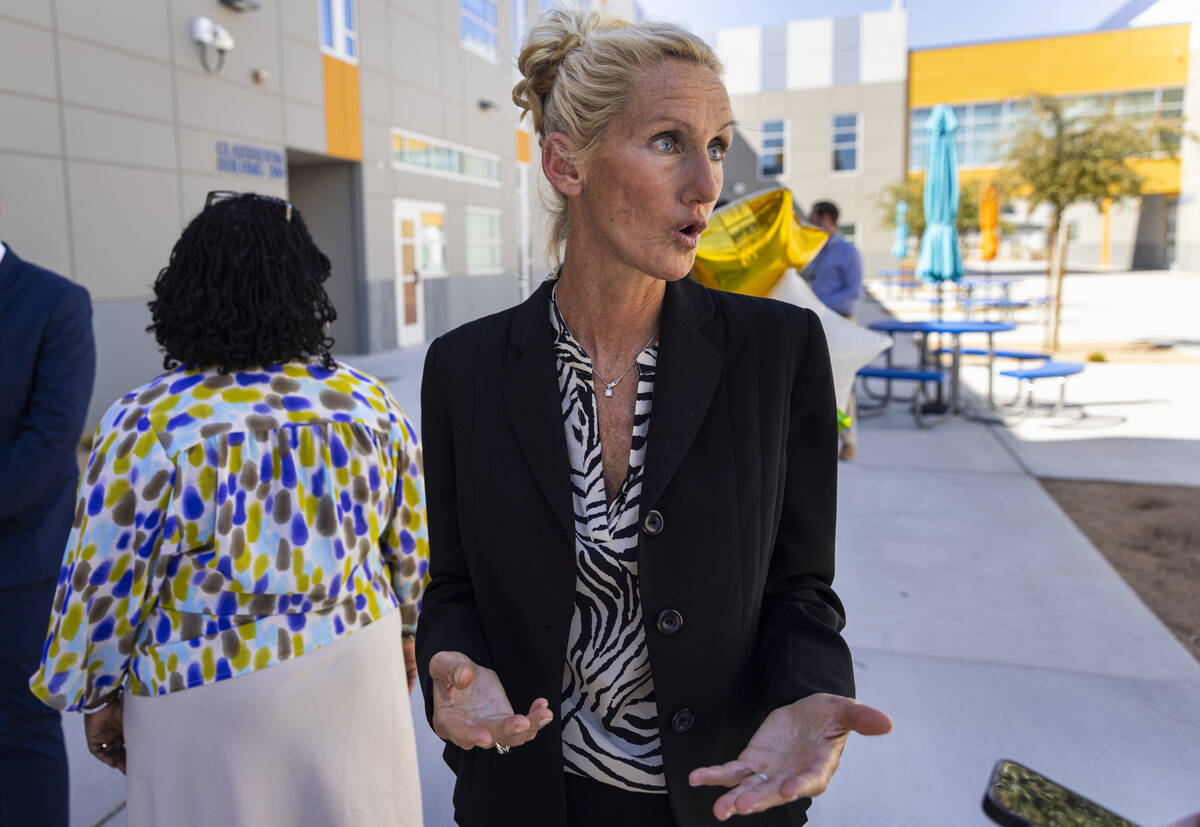State calls on CCSD to pay for budget deficit
The Clark County School District has cited state law as the reason it told principals to readjust their schools’ budgets as a potential deficit looms.
But the head of the Nevada Department of Education said the onus should fall on the district itself, not individual schools.
“Before asking principals to redo their budgets and asking them to make cuts, the Clark County School District needs to ensure they have exhausted all other alternatives, including using unrestricted funds and reviewing central expenditures,” State Superintendent Jhone Ebert wrote in a statement Tuesday.
Since CCSD sent several messages the week of Sept. 16 warning of a potential budget deficit, principals around the district have been forced to re-evaluate and adjust their strategic budget plans — cutting staff, programming and supply funding.
The district said in the message that it had failed to account for an agreed-upon 8 percent salary increase for licensed professionals in its budget, resulting in many schools having higher operating costs than their budgets would allow.
In a Wednesday letter, Ebert asked CCSD Interim Superintendent Brenda Larsen-Mitchell to answer questions regarding the potential deficit, including whether it exists and by how much, by Oct. 3.
CCSD cites state law
Larsen-Mitchell, meanwhile, said in her Sept. 20 message to staff that state law designed to give schools more autonomy is the reason why it has asked principals to make budget changes and cuts.
“Nevada state law prohibits the District from holding or directing schools’ carry forward funds,” Larsen-Mitchell wrote in the message to staff. “We have consistently communicated with principals who cannot absorb the changes that every effort will be made to provide assistance to those schools.”
Assembly Bill 469, passed in 2007, granted individual schools increased autonomy over their budgets. Schools have “strategic budgets,” which means that each school can make its own decisions on spending. For instance, one school might allocate more money on teachers, and another on supplies.
In an interview with the Las Vegas Review-Journal on Wednesday, School Board president Evelyn Garcia Morales described the budgeting process as a “little bit of a dance” between the district and schools.
Who pays?
CCEA, the educators’ union, has criticized the district and said that no educator should be affected by what the union called the district’s mismanagement.
Executive Director John Vellardita said he believes the district has money it can use to prevent cuts. He said the district has $258 million in carryover dollars — unused dollars from the previous year — as well as the $150 million in the unassigned ending fund balance, half of which the district is allowed to use. He also cited the money set aside for licensed professional positions that have yet to be filled.
In a Sept. 20 news conference, Vellardita said the budget issue is why Larsen-Mitchell should not be made the district’s permanent superintendent. Larsen-Mitchell has been the district’s interim superintendent since former superintendent Jesus Jara resigned in early 2024.
Garcia Morales urged the public to not listen to what she called the “one-sided narrative” from the union.
“I could be making an assumption here, but I don’t believe union leaders are well-versed in budgets at a school district level, especially, I don’t think they’ve ever run a financial department in a school district,” Garcia Morales told the Review-Journal.
Garcia Morales said that she did not have a complete picture to answer how exactly the district reached the point of a potential budget deficit.
Jason Goudie, the district’s chief financial officer who was fired last week, did not give a clear answer as to what happened in a Sept. 20 interview with the Review-Journal.
The district issued a statement Friday discussing the situation and pointed to unanticipated litigation and cybersecurity costs for a possible shortfall in its central budget and reiterated that it failed to account for negotiated salary increases for licensed professions — but it did not provide details about the size of the potential deficit or the financial impact of the unaccounted-for salary increase costs.
One principal’s experience
Moments after Leigh Todd, a pre-K teacher at Tate Elementary School, was named Nevada Early Educator of the Year on Tuesday, the school’s principal told the Review-Journal she was not sure how much longer the school could fund the program.
“If that day comes, that will absolutely break my heart, because it will reduce the opportunities for our students, especially the at-risk students who need it the most,” said Principal Sarah Popek.
Popek remembered how often she had to spend her own money for the supplies she needed when she was a teacher; and as a principal, she said she has made sure that the school funds anything teachers need. But with cuts, she said she will likely need to narrow the definition of what people “need” to teach, and cut back on funding for supplies.
“I knew this cliff would happen sometime. I did not think this soon,” Popek said.
At a meeting of district principals on Sept. 20, Popek said she saw a lot of tears. Many of her colleagues have already had to cut staff and entire programs, she said.
“It’s tough,” she said. “We do what we do because we care about kids, and it’s sad when money impacts the decisions that we make.”
Contact Katie Futterman at kfutterman@reviewjournal.com.


















